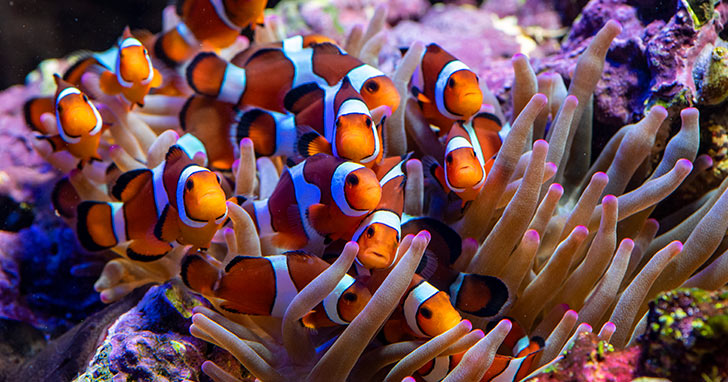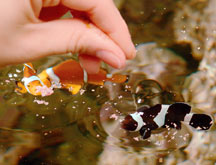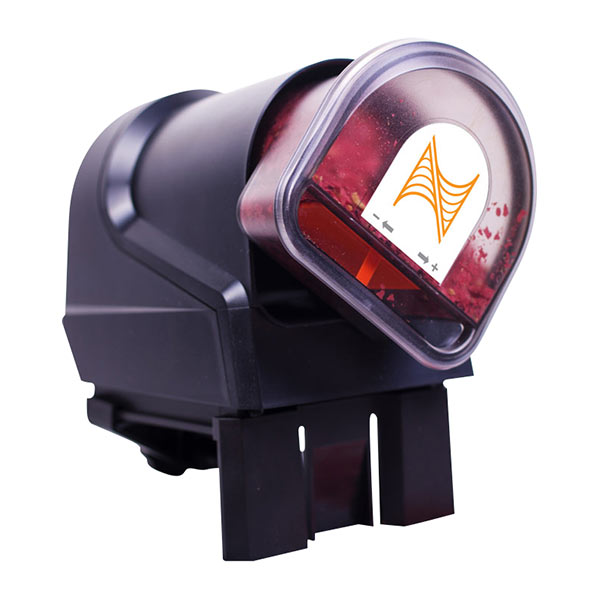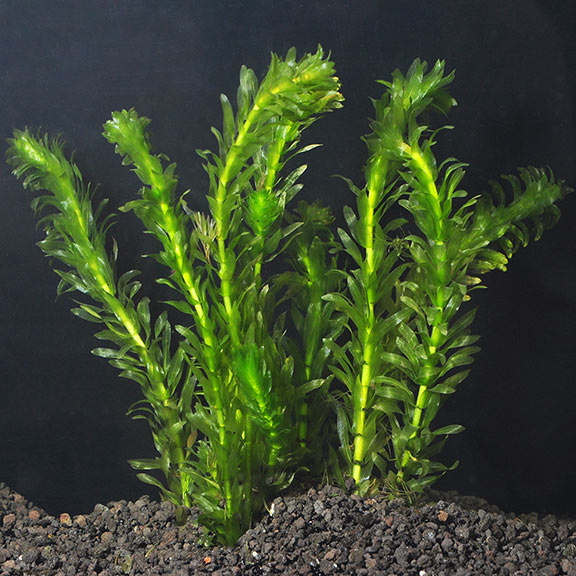
Overfeeding fish is so easy to do. First, we forget how small they are: our appetites are much bigger than their stomachs! Second, feeding is one of the only ways we can interact with the fish, so we tend to do it too often. Third, fish quickly learn that our approach often means food is on the way. They come to the front and top of the tank, appearing eager and hungry. Don't be tempted to think this is an indication that they are famished and need food immediately. Overfeeding is definitely too much of a good thing, and can lead to serious consequences.

Problems associated with overfeeding
Accumulated uneaten food and fish waste pose a number of problems, as listed below. First, they can result in lethal changes in the water chemistry. The breakdown products are toxic and can stress fish, making them prone to other diseases. Overeating, itself, can cause health problems. Finally, the pond or tank can become very unsightly, not pleasing to the eye, or the fish.
- High ammonia and nitrites - The protein in uneaten food and fish waste is broken down into ammonia and nitrites, which are extremely toxic to fish.
- Low oxygen levels - When organic material (uneaten food and fish waste) decays, it is an aerobic process, meaning it uses oxygen and produces carbon dioxide. This means there is less dissolved oxygen in the tank or pond for the fish to use.
- Low pH levels - Just as the breakdown of organic material lowers the oxygen level, it also lowers the pH of the water because acids are produced during the process. Since each species of fish has an optimal pH range, those fish that prefer an alkaline pH are especially stressed.
- Fin rot - Fin rot is a condition in which the fins can develop a moth-eaten, shaggy appearance. It most often occurs when fish are stressed, which is a common result of overfeeding.
- Fatty liver - Fatty liver, or hepatic lipidosis, is a disease more commonly seen in African cichlids and rainbowfish, and is the result of overeating. It affects the function of the liver and can result in death of the fish.
- Improper digestion - In ponds, the amount and type of food must be changed as the weather becomes colder. Below 60°F, you should feed wheat-germ-based food exclusively to your koi, and since bacterial processes will gradually slow, the amount fed should be decreased. Below 50°F, the bacteria in a fish's digestive system are no longer able to process food and you should stop feeding altogether.
- Algae bloom - Algae growth is one of the most common problems seen in ponds and aquariums. The number one cause is overfeeding. Unsightly blue-green and red algae multiply when there are large quantities of dissolved organic material, nitrates, and phosphates in the water, common occurrences when fish are overfed.
- Cloudy water - Cloudy water in either a pond or tank is usually due to decaying organic matter. If due to overfeeding, the water will generally clear if the fish are not fed for 2-3 days (for most fish this is not a problem).
- Mold - If the gravel, plants, and other décor have white, cottony material growing on them, the problem may be mold or fungus. As with algae, these organisms grow when there are increased levels of organic material in the water.
- Planaria (flatworms) - Planaria are small white or tan worms that are good indicators that water quality is not optimal. They are most often found in tanks where overfeeding has occurred. Although generally considered harmless, they will eat fish eggs.
- Clogged filters - Filter systems are designed to remove the normal amount of waste materials and breakdown products from the water, not correct the excessive problems that occur with overfeeding. Uneaten food and waste materials can collect on the filters, continue to produce toxic products, and clog the filters thereby reducing their capacity to function even more.

To avoid problems with overfeeding
The first step to avoiding overfeeding is to understand how easy it is to do, and how harmful it can be. This will give us the motivation to develop good habits when it comes to feeding our fish. Try to incorporate the following tips to prevent overfeeding:
- Feed on a schedule - Most tank inhabitants will do well if fed twice daily. If possible, more frequent and smaller feedings are preferred. In the wild, most fish do not eat large "meals" like we do, but are foraging and "nibbling" throughout the day.
- Feed the proper amount - The best way to determine how much to feed your fish is to observe them at periodic intervals while they feed. Add small amounts of food at a time (e.g., 3 flakes per fish). If all the food has been eaten within several minutes, feed a small amount more. The general rule of thumb is to only feed them as much as they can eat within 4-5 minutes. Anything not eaten after 5 minutes will likely never be eaten. As you observe your fish eating, check that all of them are eating. Some fish will eat within seconds, others, such as the scavengers, take more time. Not eating may be a sign of illness or due to more aggressive or larger fish prohibiting other fish from eating.
A common error is to feed according to tank size - adding more food to a larger tank, even if it has the same or fewer inhabitants as a smaller tank. Always feed based on the number of inhabitants, not the size of the tank. Regardless of the size of the tank, spread the food out over the surface of the water to allow more fish to eat at the same time.
- Feed the proper food - Feeding an improper, poor quality, or stale food will not only lead to malnutrition, it will lead to more waste, since the fish will not eat it. Choose the appropriate form (e.g., flake or pellet) and the appropriate size based on the tank or pond inhabitants. Some fish will need floating food, while others prefer food that sinks. Research the feeding habits of your species, and feed accordingly. Be sure to use fresh, quality food.
If switching to a new food, feed sparingly. Fish may take time to identify the new diet as food.
- Remove uneaten food - If there is uneaten food left after a feeding, remove as much of it as possible with a siphon or fine net. Irregardless of the size of your filtration unit, it was not designed to correct all the problems associated with overfeeding.
If you know or suspect overfeeding has occurred, perform a partial water change by siphoning 25% of the water from the bottom of the tank. Use the siphon to pick up as much debris from the substrate as possible.
- Include scavenging inhabitants - Scavenger fish (catfish and loaches) and invertebrates can assist in eliminating some of the uneaten food that falls to the bottom of the tank or pond. They are not a "fix-all" but can be helpful in removing food that falls to inaccessible areas of the tank that may be difficult to siphon or clean.

- Educate family members and "fish-sitters" - In general, it is best if only one family member feeds the fish. If such a schedule is not possible, use a simple log or calendar to mark off when the fish have been fed to avoid duplicate feedings.
When leaving on vacation, you have several options:
- Use proper filtration - When designing your aquarium or pond, be sure to size your filtration units correctly; bigger is always better. Provide routine maintenance on your filtration system to ensure it is operating at peak efficiency.
Conclusion
Overfeeding is the most common problem that affects aquarium and pond owners. For the health and enjoyment of your fish, Don't Feed the Fish... too much.
|